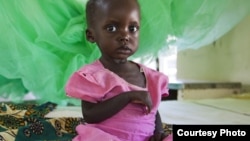Stunted growth caused by malnutrition affects as up to 50 percent of children in the southern African nation of Malawi. There’s no cure for stunting, which can cause developmental and physical problems, but good nutrition from an early age can easily prevent it.
A program led by the Children’s Investment Fund Foundation and the World Food Program is trying to provide that nutrition to Malawian children. VOA’s Anita Powell talks to project coordinator Georgina Fekete via Skype from Ntchisi district, Malawi.
Q: Thanks for talking to us, Georgina. Can you tell us what this project is all about?
A: I‘m in Malawi this week with a team and we’re working with the World Food Program, the U.N. World Food Program, to support the government of Malawi to address undernutrition.
So nutrition matters in Malawi for children’s growth, not only for their physical growth to ensure that they grow tall as teenagers then become strong adults, but also in the development of their brains. And this is really important. We see this as a really important issue. We’re stealing futures by holding children back.
Q: How big of a problem are malnutrition and stunting in Malawi?
A: It’s almost half of children who are stunted, and around 1 million, that’s 1.4 million, children in Malawi.So it’s a huge burden that exists in Malawi. Eighteen percent of school-year repetitions of are due to stunting. And children who are stunted are more likely to drop out of school.
And then if you look at the society at large — and this is really important, often people overlook this, because it’s often seen as a health issue when it’s really about bigger society issues, including the economy — if you look at the recent report that was issued, we see that undernutrition is costing countries like Malawi a huge amount. So annually it’s around $600 million, which is around 10 percent of GDP, which is enormous.
Q: What kind of results are you seeing with your supplemental feeding program and educational programs?
A: So we’ve reached — or the program through the World Food Program working with World Vision and the government in Ntchisi district — has reached 25,000 participants which is on the way to the target. The four-year program will reach around 66,000 participants. And we’re seeing a really great participation rate, which is well above 80 percent, which is on target as well. It’s really positive.
We’ve also had some anecdotal evidence. So we met with the women and asked them ‘so what change have you seen?’ And they mentioned that their children are growing much faster than some of their siblings have, and they also said that they’re much more alert.
And this really goes back to my point where I explain that nutrition really matters for cognitive development, it’s about brain development, and making sure that not only are you strong physically, but that your brain is really active.
Q: And finally, Georgina, is there anything else you’d like to say to our global audience?
A: I think I’d just really reinforce to the listeners how much nutrition matters. It’s really not an issue to overlook, it’s really not only a health issue, it’s really got economic benefits. If you invest in good nutrition you really have good returns over the long term. So it’s worth doing that at every level, and not ignoring the issue because it often gets ignored and it falls through the cracks.




